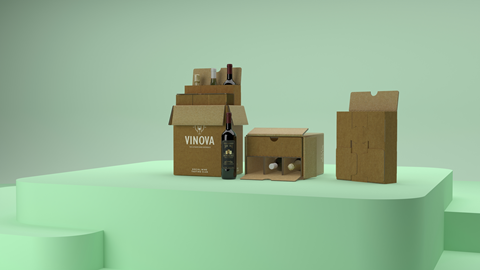
Our next Finalist Interview ahead of the Sustainability Awards is with Smurfit Kappa about its paper-based ‘Frustration-Free’ packaging for wine multipacks, nominated in the commercialized E-commerce category.
You’re a finalist in the Sustainability Awards 2023. Congratulations! To start off, could you summarise your entry, in less than 50 words?
In partnership with Amazon, Smurfit Kappa has launched a pre-certified paper-based packaging for wine multipacks which is renewable, recyclable, and biodegradable. It holds Amazon’s ‘Frustration-Free Packaging’ (FFP) certification, a world first for a generic packaging solution that caters for different case counts and all common wine bottle types.
Why do you think the judges were impressed with your entry? Tell us about what is innovative about your project and/or about its impact on packaging sustainability.
We believe it’s a combination of its sleek design, sustainability credentials and flexibility. The solution is available in two sizes, for six and twelve bottles of wine, but can be used for a lower bottle count if required. It’s an addition to our Better Planet Packaging portfolio, a range of paper-based packaging solutions designed to leave no trace on the planet.
It solves the challenge of ensuring that a fragile product survives even the most complex e-commerce supply chain. The last thing a brand wants is to disappoint consumers by having broken or damaged products arriving on their doorstep which also have a negative impact on the product’s carbon footprint.
To prevent this, Amazon introduced ‘Frustration-Free Packaging’, a set of packaging guidelines for their sellers. To obtain a FFP certification for fragile products, each product needs to pass a sequence of tests in a specialised ISTA [International Safe Transit Association] certified laboratory. By using our pre-certified packaging, the seller can bypass a long and complex process to meet the FFP criteria. Businesses selling wine on Amazon Marketplace can now use this ready-to-sell, pre-certified multipack to avoid this time-consuming testing process.
How has your innovation/initiative been received?
The feedback has been excellent. The eCommerce wine sector in particular experienced huge growth during the pandemic so there was a real need for an effective and sustainable packaging solution.
Customers appreciate the fact that this pack simplifies and speeds up processes, enhancing our operational efficiency and Amazon’s. Many Amazon sellers aim to have products certified as FFP so they can avail of the many business benefits that come with it, for example eliminating chargebacks to Amazon.
Most importantly, our innovative solution helps sellers get their products to the end consumer more quickly, which is crucial in today’s fast-paced environment. It also shows the importance of collaboration. Together, we have developed a solution that is beneficial for all parties involved.
You’re shortlisted for the E-Commerce category. What do you see as the key demands and challenges in relation to packaging for the direct-to-consumer channel?
The regulatory framework (the proposed Packaging and Packaging Waste Regulation) on the horizon will have a big impact on the direct-to-consumer channel, where sustainability will continue to be the driving force.
A key point in the legislation when it comes to e-commerce is to reduce the amount of void in parcels to make transport as efficient and optimised as possible. This is something we know is high on the agenda for consumers and very much in line with our Better Planet Packaging initiative. Right-sized, fit-for-purpose packaging has a lower carbon footprint.
We’ve known for many years that when companies focus on sustainability, it’s not only good for the environment but also for their brand image. Several years back, we introduced our “Perfect Size Pack Service” aimed at redesigning the packaging portfolio of e-commerce businesses to minimize empty space. After conducting numerous studies, it’s evident that reducing this empty space while ensuring protection remains a top priority for many.
Therefore, we must continue to design flexible and easy-to-pack solutions that eliminate any risk of product damage during transit, ensuring products arrive in perfect condition. Taking these steps not only keeps customers happy but also improves the perception of the brand.
What do you think are the main opportunities in this area or what future innovations do you predict in this area?
After years of growth within e-commerce, the focus has shifted slightly to the efficiency and streamlining of processes. This shift will place a greater emphasis on automation, specifically optimizing the packing process using new technologies and providing the right amount of packaging for specific products and orders.
There is no doubt that the shift towards sustainable packaging solutions will continue and there will be a strong focus on developing paper-based packaging concepts and materials that are alternatives to today’s unsustainable packaging. As artificial intelligence (AI) technologies advance, a significant transformation is likely on the horizon for the packaging industry.
We see already today that AI enables innovators to revolutionize design processes and enhance the overall consumer experience. We are currently exploring AI as a component to develop innovative solutions and we are actively seeking opportunities to ensure our ongoing ability to create sustainable packaging solutions.
The winners of the Sustainability Awards 2023 will be announced at the Sustainable Packaging Summit, which takes place in Amsterdam on 14-15 November. The Summit mobilizes leaders of the FMCG value chain, policymakers, NGOs, recyclers and investors to collaborate, remove barriers and identify opportunities on the road to sustainable transformation.
To learn more or register, visit https://www.packagingsummit.earth/amsterdam2023/.
If you liked this article, you might also enjoy:
The L’Oréal approach to packaging sustainability
What steps is Apple taking to make its packaging more sustainable?
How did Brazil achieve its 100% aluminium can recycling rate – and can it be replicated in the EU?
Experts have their say on the EU’s Packaging and Packaging Waste Directive revisions














No comments yet